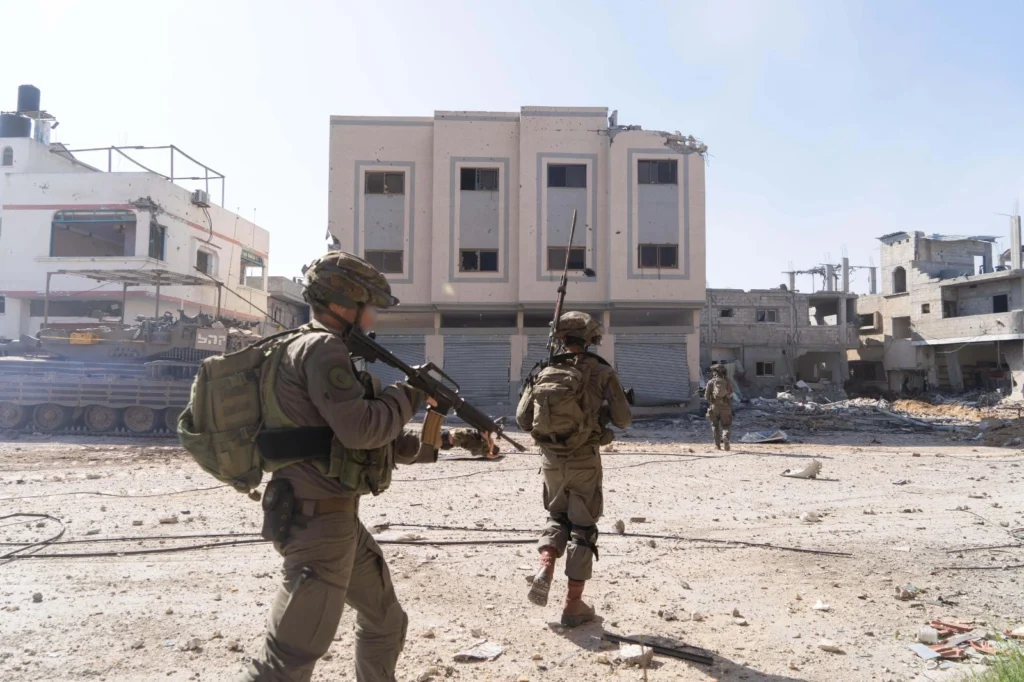IN THE MEDIA
Aid worker tragedy must not lead to permanent ceasefire
April 9, 2024 | Colin Rubenstein

The Australian – April 9, 2024
It would only make matters worse if the tragic and horrific accidental killing of seven humanitarian aid workers from the World Central Kitchen on April 1, including Australian Zomi Frankcom – for which the IDF and the Israeli Government swiftly apologised, before launching a fully independent investigation into how this tragedy occurred – were to sabotage efforts to reach a temporary ceasefire deal between Israel and Hamas.
Yet anger over that incident is prompting Australian leaders to make comments that risk damaging any such hopes.
Everyone seems to be forgetting Israel has repeatedly offered Hamas a six-week ceasefire deal, along with numerous other concessions, in exchange for Hamas releasing women and elderly hostages. Hamas has refused over and over again for months now – including last week – demanding Israel instead completely withdraw from Gaza and effectively allow Hamas to continue ruling the area in exchange for any hostage release.
Western governments which effectively demand a permanent ceasefire from Israel, while making only lip service, hollow demands on Hamas, such as calling for the release of hostages, help convince Hamas to keep saying no, hoping the world will pressure Israel into eventually meeting its demands.
The six-week ceasefire Israel has offered would allow the humanitarian aid situation in Gaza to improve significantly. Thus, those publicly calling for an immediate humanitarian and implicitly permanent ceasefire, including some key figures in Australia, are actually making any such temporary ceasefire harder to achieve.
Hamas’ strategy since its October 7 massacres has been largely to hide in tunnels or among civilians, hoping to eventually re-emerge after international pressure on Israel eventually forces it to allow a return to something much like the status quo that existed on October 6. Then, still in power and with the achievement of having coerced Israel into freeing many hundreds of convicted terrorist killers, it would have the means to rearm and try to repeat the October 7 slaughter again and again, as its leaders assert it will.
Perhaps nothing exemplifies Hamas’ strategy in the current conflict than the IDF’s recent second operation in the Shifa Hospital compound in northern Gaza, which lasted two weeks, ending on April 1. This saw at least 200 armed terrorists eliminated, including a top Hamas commander, and more than 900 terror suspects arrested.
Israeli forces first took control of the site in November, after lengthy gunbattles with terrorists sheltering there, and found a major command and control centre beneath the hospital grounds.
Israeli reserve units soon withdrew from most of northern Gaza, and the front moved south. But Hamas returned to Shifa in force – presumably hoping to make it a centre for renewed military control over northern Gaza in future and to prepare to carry out their self-declared plans to repeat the massacre of October 7 “again and again.”
Unsurprisingly, the overwhelming majority of Israelis are absolutely determined to prevent this scenario.
But Hamas’ strategy has been quite effective internationally – demands have grown in Washington, Europe, at the UN, and here in Canberra that Israel agree to end its war without Hamas’ final defeat. The tragic WCK convoy error of April 1 only increased that pressure.
As part of this pressure, some analysts and foreign leaders have strongly, but wrongly, implied that Israel’s war strategy is solely the product of the political calculations of Israeli PM Binyamin Netanyahu and his coalition partners.
Netanyahu is unpopular in Israel, polls show, and some of his coalition partners are certainly prone to making extreme and irresponsible statements. Yet the same polls also indicate Netanyahu and the War Cabinet – which contains Netanyahu opponents Benny Gantz and Gadi Eisenkot – speak for an overwhelming majority of Israelis in pursuing two key objectives before the conflict ends: obtaining the release of the Israeli hostages still held in Gaza and toppling Hamas’ rule throughout Gaza and eliminating it as a significant military threat.
Until recently, most foreign leaders said they agreed with these goals.
Israeli Prime Minister Benjamin Netanyahu has vowed to carry out a Rafah invasion, arguing the invasion of the southern city is needed for a victory.
In January, Foreign Minister Penny Wong said: “Hamas has no place in the future governance of Gaza.” Her spokesman reiterated that stand on April 4.
And this should remain everyone’s goal if they do not want both Gazans and Israelis to suffer repeated bloodshed and devastation in the future.
Of course, Gaza’s civilians are paying a very high price in this conflict, as Hamas always intended when it illegally and cruelly turned the entirety of the Gaza Strip into a fortress, with military tunnels and prepared arms caches enmeshed in all civilian neighbourhoods, including homes, apartment buildings, schools, mosques, hospitals, kindergartens, clinics, and aid centres. It also has repeatedly abused both aid convoys and ambulances for military purposes.
Yet there are now major moves in place to dramatically increase aid access without discarding Israel’s strategically essential war aims. April 7 saw 322 aid trucks enter Gaza, the most since the conflict began. Israel has also now promised to establish a “humanitarian command centre” with NGOs to co-ordinate aid deliveries more effectively and safely
Better aid distribution in Gaza and safeguards for aid workers are absolutely needed. However, it is folly to imagine that the way to achieve this is by playing into Hamas’ wartime strategy of forcing Israel to stop its currently successful campaign prematurely and leave Hamas once again in control of Gaza.





